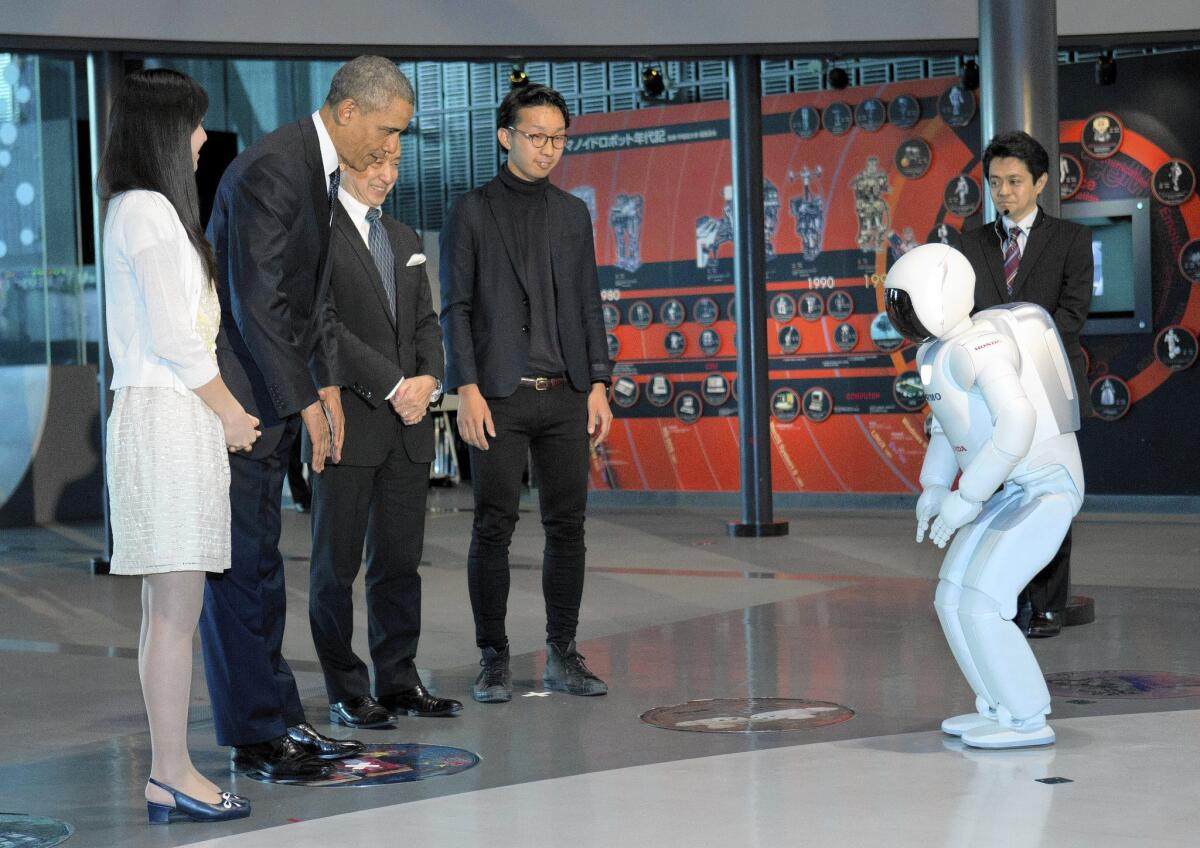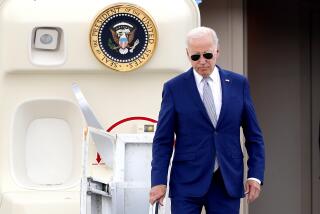Japan-South Korea tension a hurdle for Obama’s Asia strategy

- Share via
SEOUL — As he hops around the Western Pacific this week, President Obama hopes to unite much of Asia around a free-trade deal, updated alliances and a new power balance. But he first must persuade two of America’s closest allies to stop squabbling.
Jetting from Tokyo to Seoul on Friday morning, his second stop on the trip, Obama was between two nations mired in an old feud. South Koreans are furious over what they perceive as inadequate remorse from Japan over its brutal colonization of their nation from 1910 to 1945 and its use of Korean “comfort women” as sex slaves during World War II.
Japanese Prime Minister Shinzo Abe and Korean President Park Geun-hye have traded slights and diplomatic digs for months. Tension is so high that a recent poll found Abe as unpopular among South Koreans as North Korea’s strongman, Kim Jong Un.
Obama will spend Friday laying a wreath at South Korea’s national war memorial, visiting a historic palace in Seoul and trying to ease the tension between Park and Abe, who was Obama’s host for two days in Tokyo. At stake is coordination on key security and economic issues in northeastern Asia, where nuclear-armed North Korea threatens both Japan and South Korea.
“It is very frustrating for the administration,” said Andrew Scobell, a political scientist with Rand Corp. “When you get the two together for military exercises or a meeting, the U.S. is in the middle, Japan on one side and South Korea on another. It hurts our ability to communicate seamlessly with our allies.”
The White House has tried to play peacemaker. Obama and his team spent weeks making phone calls and holding meetings to bring Park and Abe together on the sidelines of a nuclear summit in The Hague last month.
The two met with smiles and a handshake, as Obama stood behind them. Abe attempted to speak to Park in Korean. South Korean reporters described Park’s reaction as “stony-faced.”
Anger was fueled in Seoul by recent reports that Abe had sent a ritual offering to the Yasukuni shrine in Tokyo, which commemorates Japanese war dead, including former leaders convicted as war criminals after World War II. Abe visited the shrine in December.
The Japanese leader sounded an apologetic note at a news conference with Obama in Tokyo on Wednesday.
When an American reporter asked about Yasukuni, Abe noted that during the war Japan “inflicted tremendous damage and pain,” and he said there was “no change” in his government’s past apologies. He said he had visited the shrine to pray for the war dead, not to send a new message, and he pledged to devote himself to human rights and the rule of law.
South Korean attitudes toward Japan, as reflected in a poll published in February by the Asan Institute for Policy Studies, remain almost uniformly hostile. Besides the historical issues, South Koreans are unhappy about Abe’s claims to disputed East China Sea islands known as Dokdo to South Koreans and Takeshima to Japanese.
“Perhaps Mr. Abe’s only saving grace has been that North Korea has continued to pursue provocations, ensuring that Japan remains only slightly more favorable,” the institute concluded.
Obama remained silent on the Yasukuni dispute. Like Presidents Reagan and George W. Bush, he visited the Meiji shrine, which honors the 19th century ruler who helped modernize feudal Japan.
Obama’s trip has already provided one disappointment. As he prepared to leave Tokyo, negotiators ended talks on the proposed Trans-Pacific Partnership, a 12-nation trade deal, without the breakthrough for which White House aides had hoped.
The politics of protocol will only get tougher as the trip goes on. In particular, Obama wants to avoid offending China, which is embroiled in maritime disputes with most of its neighbors.
In Tokyo, the president affirmed the U.S. security treaty with Japan, but he emphasized the need to work to resolve territorial differences in a peaceful manner.
“Not escalating the situation, keeping the rhetoric low, not taking provocative actions, and trying to determine how both Japan and China can work cooperatively together,” Obama said, characterizing the advice he gave Abe behind closed doors. “And I want to make that larger point. We have strong relations with China. They are a critical country not just to the region but to the world.”
Times staff writers Kathleen Hennessey and Don Lee in Washington contributed to this report.
More to Read
Sign up for Essential California
The most important California stories and recommendations in your inbox every morning.
You may occasionally receive promotional content from the Los Angeles Times.













